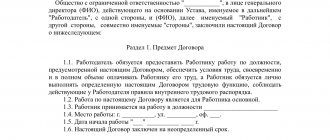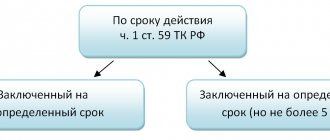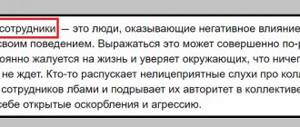Article 15. Labor relations
(as amended by Federal Law No. 90-FZ of June 30, 2006)
Labor relations are relations based on an agreement between the employee and the employer on the personal performance by the employee for payment of a labor function (work according to the position in accordance with the staffing table, profession, specialty, indicating qualifications; specific type of work entrusted to the employee), the employee’s subordination to internal labor regulations while the employer provides working conditions provided for by labor legislation and other regulatory legal acts containing labor law norms, collective agreements, agreements, local regulations, employment contracts.
What will be evidence of the existence of an employment relationship? Explanations of the Supreme Court of the Russian Federation
Clause 18 of the Resolution of the Plenum of the Supreme Court of the Russian Federation dated May 29, 2018 N 15 “On the application by courts of legislation regulating the labor of workers working for employers - individuals and for employers - small businesses that are classified as micro-enterprises” contains the following explanations:
When resolving the issue of whether there were labor relations between the parties, the court, by virtue of Articles 55 and 60 of the Code of Civil Procedure of the Russian Federation, has the right to accept any means of proof provided for by procedural legislation.
Such evidence may include, in particular:
1) written evidence, for example:
- issued pass to the employer’s territory;
- log of employees' arrival and departure for work;
- documents of the employer's personnel activities: work schedules (shifts), vacation schedules, documents on sending an employee on a business trip, on assigning fire safety responsibilities to the employee, an agreement on the employee's full financial responsibility;
- payroll slips, cash disbursement statements, information about the transfer of funds to the employee’s bank card;
- documents of the employer's business activities: invoices filled out or signed by the employee, invoices, copies of cash books on revenue received, waybills, applications for cargo transportation, certificates of work performed, visitor log, correspondence of the parties to the dispute, including by e-mail;
- documents on labor protection, such as: a log of registration and briefing at the workplace, certificates of testing knowledge of labor protection requirements, sending an employee for a medical examination, a certificate of medical examination of the employee, a card for a special assessment of working conditions);
2) testimony
3) audio and video recordings and others.
Article 16. Grounds for the emergence of labor relations
Labor relations arise between an employee and an employer on the basis of an employment contract concluded by them in accordance with this Code.
In cases and in the manner established by labor legislation and other regulatory legal acts containing labor law norms, or the charter (regulations) of an organization, labor relations arise on the basis of an employment contract as a result of:
(as amended by Federal Law No. 90-FZ of June 30, 2006)
election to office;
(as amended by Federal Law No. 90-FZ of June 30, 2006)
election by competition to fill the relevant position;
appointment to a position or confirmation in a position;
assignments to work by bodies authorized in accordance with federal law against the established quota;
(as amended by Federal Law No. 90-FZ of June 30, 2006)
court decision on concluding an employment contract;
the paragraph is no longer valid. — Federal Law of June 30, 2006 N 90-FZ.
Labor relations between an employee and an employer also arise on the basis of the employee’s actual admission to work with the knowledge or on behalf of the employer or his representative in the case where the employment contract was not properly drawn up.
(Part three introduced by Federal Law No. 90-FZ of June 30, 2006)
Employment contract
In accordance with Article 56 of the Labor Code of the Russian Federation, an employment contract is an agreement between an employer and an employee, according to which:
- The employer undertakes:
- provide the employee with work in the agreed upon specialty,
- ensure safe working conditions,
- pay the employee wages in a timely manner and in full.
The employee undertakes:
- personally perform their duties,
- comply with the internal labor regulations in force for this employer.
Based on the provisions of Article 67 of the Labor Code of the Russian Federation, an employment contract is concluded in writing and drawn up in two copies, each of which is signed by the parties. One copy of the employment contract is given to the employee, the other is kept by the employer.









